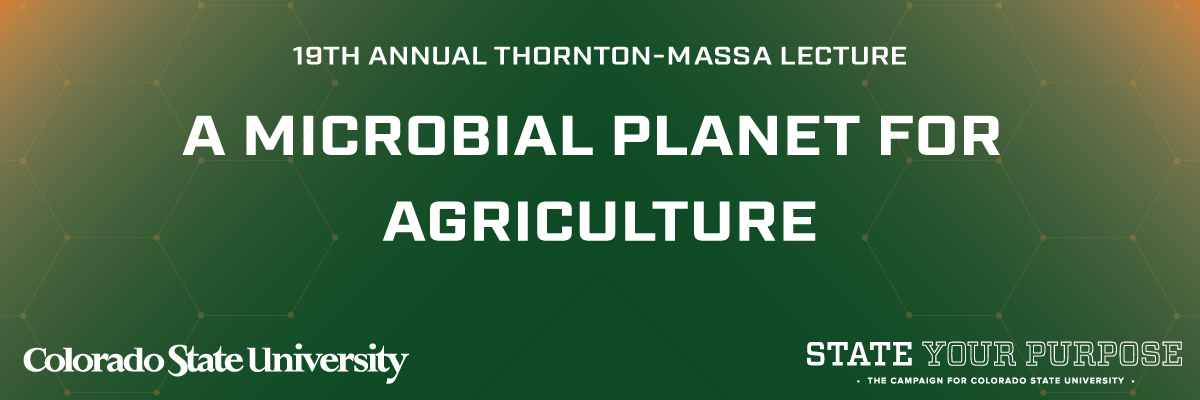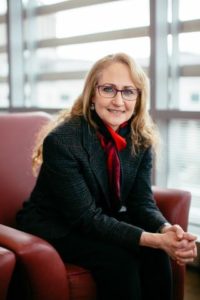
Our world and our health are governed by things unseen – invisible communities of microbes in our bodies and in our soil. In her work as a microbiologist, Jo Handelsman is trying to understand how these invisible microorganisms communicate, interact, and play crucial roles in infectious diseases.

Handelsman, a faculty member at the University of Wisconsin-Madison and a former White House science advisor, will be on the Colorado State University campus Sunday, Oct. 28, to deliver the 19th annual Thornton-Massa Lecture, 3:30-5 p.m. in the Lory Student Center Theatre. Free and open to the public, the Thornton-Massa lecture is an endowed annual series hosted by the College of Natural Sciences and the College of Agricultural Sciences. Handelsman’s talk is titled “A microbial planet for agriculture.”
The director of the Wisconsin Institute for Discovery at UW-Madison, Handelsman is also the Vila Research Professor and Howard Hughes Medical Institute Professor. She served during the last three years of President Barack Obama’s administration as associate director for science in the White House Office of Science and Technology Policy
Research in Handelsman’s lab at UW-Madison focuses on understanding diversity in microbial communities and their role in infectious disease. In particular, she is interested in understanding the genetic basis for stability of microbial communities, the role of a gut community as a source of opportunistic pathogens, and the soil microbial community as a source of new antibiotics and genes for antibiotic resistance.
About the lecture series
The benefactors of the Thornton-Massa Lecture Series are the family of Bruce and Mildred Thornton, and Dr. Emil Massa. Their shared interest in biodiversity, improved plant genetics and related topics led them to endow an annual lecture through the College of Agricultural Sciences and the College of Natural Sciences.
Bruce and Mildred Thornton shared a lifelong interest in, and commitment to, the study, identification, and preservation of seeds.
Born in 1904, Mildred attended what was then Colorado Agricultural College and was the first woman to graduate with a master’s degree in botany in 1928. That year she went to work as a junior botanist at the Federal Seed Laboratory in Washington, D.C. Mildred married Bruce Thornton in 1930. She worked intermittently at the Colorado Seed Laboratory from 1934-1961. When Bruce retired in 1961, she took over the directorship of the laboratory until she retired in 1970. During her tenure, she continued to maintain its excellence in seed research and in the training of seed analysts. Mildred received several awards for her work, including Colorado State University’s Henry Award and Honor Alumna.
A Berthoud native, Bruce earned an animal husbandry degree from CAC in 1918 and returned to study botany and plant pathology in 1926. Bruce served on the faculty and the Agricultural Experiment Station staff from 1927 until 1962 and headed the Colorado State Seed Laboratory from 1940 to 1961. He was an honorary member of the Association of Official Seed Analysts, charter and honorary member of the Colorado-Wyoming Academy of Science, and a fellow of the American Association for the Advancement of Science.
Both Mildred and Bruce Thornton spent years of their lives in dedicated service to CSU and the Fort Collins community.
Dr. Emil Massa was a Denver physician with a longstanding interest in plants, plant breeding and biodiversity. A native of Cleveland, Massa received his undergraduate degree from Denison University in Granville, Ohio. He earned a medical degree in 1953 from Northwestern University, and entered private practice as an orthopedic surgeon in Denver in 1960. He retired in 1991.
Massa was particularly influenced by Nikolai I. Vavilov’s book, The origin, variation, immunity, and breeding of cultivated plants. His interest in plant genetics was the basis for his support of many plant-oriented institutions, including the Denver Botanic Gardens, the Peoples Park program of the Denver Parks and Recreation department, and this lecture series.
